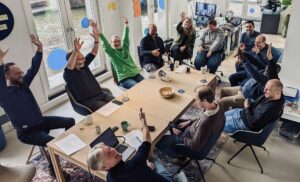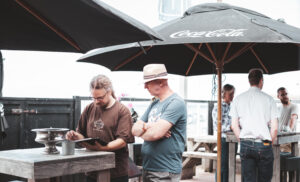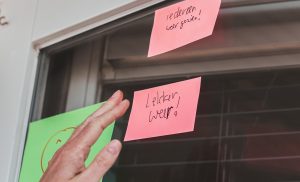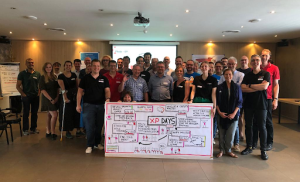With every major change in a company’s way of working, there are groups with shared interests who come together to talk about their experiences. They help each other out with challenges, share new information or methods, test experiments, share results, and are each other’s shoulder to cry on when things get tough. The main objective is: you are stronger together! We often call such a group with similar interests a Community of Practice (CoP for short), but also names like ‘Guild’, ‘Birds of a Feather’, ‘Community of Interest’ or just ‘community’ occur. In this article we will tell you about some of the important aspects of the Scrum Master Community of Practice.
The beginning
The creation of a Community of Practice (further: CoP) is often quite spontaneous: there are one or more people who think there is a need for such a thing and they start arranging it. Sometimes it starts as an ‘Agile Lunch’, where people with their own packed lunch (or with organized sandwiches: people like to come to a meeting if they get free food) get together and talk about Agile work in an unstructured way. Sometimes a meeting is ‘just’ organized to which the right people are invited. Usually the network is also used to get people excited.
Who are the right people for a Scrum Master CoP?
In principle, any Agile-minded person is welcome. People in the Scrum Master role are actually expected to join regularly, but participation should always be voluntary. What you often see in practice is that the more experienced Scrum Masters and/or Agile Coaches start the CoP. They invite the less experienced Scrum Masters to use these sessions to learn and also share their knowledge. Often, the experienced Scrum Masters have gained their experience outside the organization, and the less experienced Scrum Masters fill this role because the role is new in the organization. After all, we are in the midst of change. This last group of people need experienced learning masters and a CoP is a way to do that. That said, the less experienced Scrum Master can of course benefit from an experienced personal mentor.
How the Community of Practice works
A Community of Practice is for and by the community. This means that it is self-organized. Apart from interest from management, managers are not meant to be involved in organizing this group of people. Someone (or a small group) will stand up to make sure that sessions are planned and that the CoP sessions are prepared. This small group will ensure that there is a theme or topic for each session and that CoP members volunteer to provide the content for one session.
Set topics
If the CoP sessions do not have a pre-communicated theme or format, people quickly drop out. They don’t know how interesting or important their participation will be and they have other important things to do. On the other side there are people who actually thrive better in a session that has no fixed theme or format, so it is certainly nice to organize an occasional ‘unfilled’ CoP session as well.
Recurring sessions
The self-organizing ability of the CoP is also used to find the right rhythm and timing of the sessions. Everyone benefits from peace and routine and a recurring meeting on the same day and time provides that routine. In the beginning of a Community with many inexperienced people, it is best to set the rhythm of planned sessions weekly. You will see later if the same rhythm as the Sprints works better. But in the end it is always up to the group itself.
The Community, apart form the planned sessions
Especially at the start of the Community, it is important to keep the group of people together and involved with each other and each other’s work. The inexperienced Scrum Masters are still struggling with their roles and not all of them are going to look for help. Therefore, it is up to all Scrum Masters to regularly take some time to make a tour around the organization and stop by the other Scrum Masters. Just to talk about what is going on. Showing interest works and if topics come up that might be interesting for a larger group, you’ve immediately found a good topic for an upcoming CoP session.
Community of Practice sessions
Topics of the sessions can be whatever the community is interested in. It is advisable to have at least two people that prepare and lead each session. Firstly, because this means that you are already sharing knowledge during the preparation. Secondly, guiding a session together is less scary than ‘standing in front of the group’ on your own. And finally, the better the cooperation during the preparation, the stronger the bond between these people. If this group also consists of a combination of experienced and inexperienced Scrum Masters, the ultimate profit in knowledge sharing has been achieved.
Pitfall: too little action
A self-organizing CoP is a good thing, but also a pitfall. Especially with Scrum Masters. Scrum Masters are so focused on making a team self-organizing that all the Scrum Masters in the community are often very busy making sure that the others in the group can do their thing. The result is that everyone wants to help each other, but no one really puts in the work to get sessions organized. To prevent this from happening, it is necessary that someone in the group stands up to organize the sessions.
Pitfall: no topics
It can be quite difficult to find a topic for each session. Soon you will run out of topics for the sessions and community members will show up less often. When this happens, a reboot of the CoP is needed. What can work very well is to create a kind of marketplace for knowledge. Who is looking for certain knowledge and who is offering that knowledge? To inspire this, themes from the Scrum Guide can be used. What can also be useful is to set up a number of main themes that rotate across the sessions and make a new schedule for the upcoming sessions.
With a reboot, it is also often the case that new leaders emerge for the group. And that’s totally fine, that matches with self-organization.
Finally
A Scrum Master Community of Practice is a strong mechanism for sharing knowledge within the organization. It does take effort to keep such a Community going, so it is important that the organization offers the participants of a CoP the space to do so.
Do you have experiences with the Scrum Master Community of Practice and would you like to share them? Or would you like to know more about it? Please feel free to contact us, we would love to talk to you!





